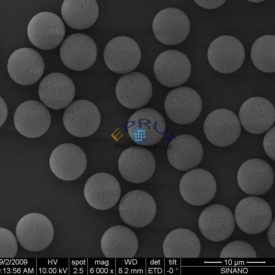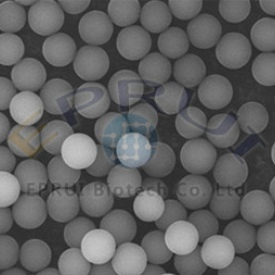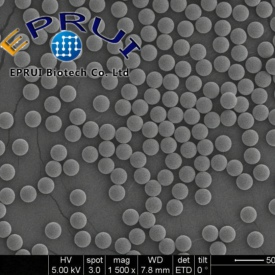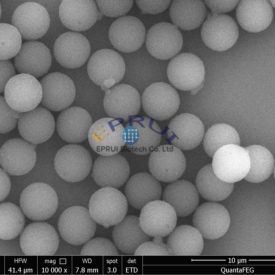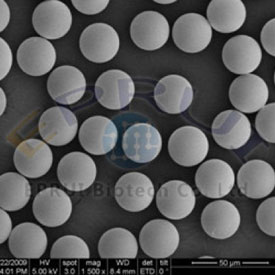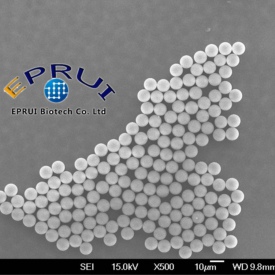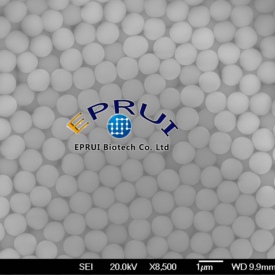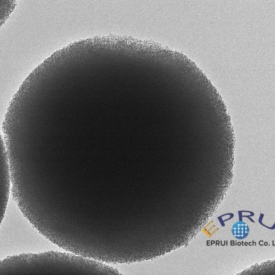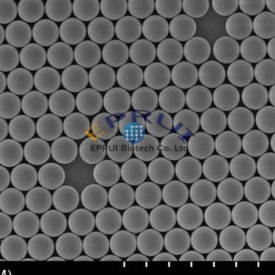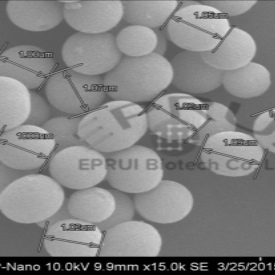Monodisperse microspheres are microbeads with narrow particle size distribution. We use CV, coefficient of variation to evaluate the uniformity of beads. The lower of CV, the narrower of the particle size distribution. There are various materials can be synthesized as monodisperse microspheres such as polymer, silica and TiO2.
EPRUI Biotech Co. Ltd. is expert in making monodisperse polymer microspheres: monodisperse polystyrene microspheres, monodisperse PMMA microspheres, monodisperse GMA microspheres as well as monodisperse silica microspheres.
We can make 20 nm – 1000 um monodisperse microspheres with controlled narrow particle size distribution as well as targeted functionalization.
How to synthesize monodisperse microspheres?
In order to synthesize monodispese microspheres, an efficient procedure was employed by combining dispersion and seeding polymerizations together. The polymerization can be divided into two processes: nucleation and growth. Monodisperse polystyrene seed colloids with a diameter of 2 μm were synthesized in the nucleation process using dispersion polymerization, and then the seed colloids were swollen by monomer and further polymerized in the growth process. Finally, monodisperse polymer microspheres with an average diameter of 10 μm were obtained.
Monodisperse Microspheres Application
Monodisperse particles are often used in the field of self arrangement of microspheres, filter membrane screening, fluid dynamics research, photonic crystal film formation, instrument calibration, particle size standard, chromatographic as well as medical and biochemical industries.
Spacer grade monodisperse microbeads are specifically designed with a sharp maximum diameter cut-off to control bond-line thickness (gap thickness) of an adhesive layer. For this application, the customer will mix these microspheres into the desired adhesive. Just a small amount of spacer beads can create a controlled gap as well as precisely define and maintain specified bond-line thickness. Spacer grade monodisperse microsphere was specifically developed for those customers seeking extra tight bond line control. Glass and silica spacers offer the extra benefit of high crush strength, resistance to most solvents and high temperature performance.
Bond-line spacers are used in many industries including gas plasma displays, automotive mirrors, electronic displays, flip chip technology, filters, microscopy, and electronic equipment.
Product List
Porous PS/DVB Microbeads
Porous PS/DVB microspheres are PS/DVB microspheres with nanometer pores on the surface. It is widely used in the industries of organic wastewater treatment, drug separation and purification, catalyst carrier and HPLC packing field. Biological macromolecules, such as protein, nucleic acid and sugar, have their [...]
PMMA Microspheres
PMMA microspheres are PMMA particles with spherical morphology. Poly(methyl methacrylate) (PMMA), also known as acrylic or acrylic glass. It is a transparent thermoplastic often used in sheet form as a lightweight or shatter-resistant alternative to glass.
Non-Functionalized Polystyrene
EPRUI offers uniform polystyrene latex microspheres that may be used as-is for self arrangement of microspheres, filter membrane screening, fluid dynamics research, photonic crystal film formation, instrument calibration, particle size standard and chromatographic media or coated with proteins via adsorption for use in diagnostic tests [...]
Functionalized Polystyrene
Our functionalized polystyrene latex microspheres including carboxyl, amine, epoxy, aldehyde, methyl groups are suitable for the covalent immobilization of polypeptide, protein, antibody, oligonucleotides and other biomolecules. Microspheres with particle size below 3um are supplied as a 10% solids suspension (100mg/mL) in de-ionized water with surfactant [...]
Sulfonated Polystyrene Microspheres
EPRUI Biotech can supply sulfonated polystyrene microspheres. Sulfonated Polystyrene microsphere is spherical, low cross-linking polystyrene/divinylbenzene (PS/DVB) microbeads with their surfaces modified with sulfonic acid (-SO3H). It is a kind of cationic exchange chromatography resin which is prepared by sulfonating PS/DVB microspheres to make it [...]
Non-Functionalized Silica
Silica microspheres with natural hydroxyl or silanol (SiOH) surface groups for adsorption of nucleotides with low protein binding. Non-functionalized silica microspheres are available as 10% solids (w/w) aqueous suspensions or in the dry form in these standard amounts: 1g, 5g,10g... EPRUI Biotech cooperates tightly [...]
Functionalized Silica Microspheres
Our functionalized silica microspheres including carboxyl, amino, epoxy, aldehyde, groups are suitable for the covalent immobilization of polypeptide, protein, antibody, oligonucleotides and other biomolecules. Microspheres with particle size below 3um are supplied as a 10% solids suspension (100mg/mL) in de-ionized water with surfactant and [...]
Porous Silica Microspheres
Porous silica microspheres are silica microspheres with nanometer pores on the surface. EPRUI Biotech cooperates closely with top monodisperse microspheres research centers in China and can supply high quality monodisperse mesporous silica microspheres for labs, institutions, universities or related industry. [...]
GMA Microspheres
GMA microspheres are glycidyl methacrylate particles in spherical morphology. EPRUI Biotech is closely cooperated with top microspheres research centers in China and can supply monodisperse glycidyl methacrylate microspheres with uniform particle size (monodispersity 5%-10%), good hydrophilicity and rich epoxy group. Customization is accepted if [...]
TiO2 Microspheres
EPRUI Biotech cooperate closely with the leading microspheres research institution who is now able to manufacture ultra-pure monodisperse TiO2 microspheres with precisely controlled uniform particle size and narrow size distribution. Specifications Monodisperse Titania Nanospheres/Microspheres [...]

